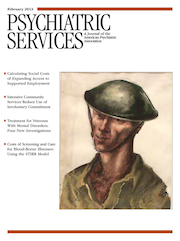In the January issue we reported on a study in which veterans who received treatment for posttraumatic stress disorder (PTSD) in Veterans Affairs (VA) residential rehabilitation programs showed only small improvements (
1). In a commentary, Frueh (
2) claimed that veterans do not benefit from PTSD treatment even though most civilians do. He suggested that disability pensions give veterans “a powerful secondary-gain incentive to remain symptomatic” and argued that the VA must choose between spending on treatment or on disability pensions.
There are several inconsistencies in Dr. Frueh’s argument. First, data showing that civilians benefit from PTSD treatment are from clinical trials of trauma-focused psychotherapies, not residential milieu treatment. Trauma-focused psychotherapies are more efficacious than other PTSD treatments. Veterans and civilians who receive these psychotherapies can improve substantially, even if they do not recover fully. Over 60% of 1,888 veterans treated in a national rollout of prolonged-exposure psychotherapy showed clinically significant improvement (
3). But most American psychotherapists, in community and government settings, do not regularly use evidence-based psychotherapies for PTSD. The VA is playing a leadership role in disseminating such therapies and has trained more than 6,000 providers in trauma-focused treatments. But our best PTSD treatments are still not as widely available to veterans or civilians as they need to be.
A second misguided assumption is that veterans living with PTSD may require either treatment or a pension, but not both. Frueh noted that about 45% of Iraq and Afghanistan veterans have applied for VA disability benefits, compared with 11% and 16%, respectively, of World War II and Vietnam veterans. But the 45% rate represents pensions for all disabilities, not just PTSD, and the comparison is misleading. More importantly, a pension may not obviate the need for treatment. A literature review showed no empirical support for the assertion that seeking compensation makes military veterans or motor vehicle accident victims less likely to respond to PTSD treatment (
4). Studies of supported housing programs suggest that there may be advantages to integrating treatment and economic aid rather than keeping them separate processes. More innovative service models that combine economic assistance, evidence-based PTSD treatment, and vocational support might help more veterans with PTSD return to higher functioning and greater independence.
Frueh is correct that the VA is obligated to provide high-value mental health care, especially when treatment needs are growing, health care costs are rising, and federal budgets are shrinking. A recent RAND evaluation of care processes concluded that VA mental health services for schizophrenia, bipolar disorder, PTSD, major depression, and substance use disorders “are usually as good as or better than those delivered by private health plans” (
5). This is encouraging; however, ensuring value requires assessing outcomes as well as processes and costs. Unlike many other areas of medicine, standardized outcome measures are still not widely used in mental health care. More routinely assessing PTSD treatment outcomes of veteran and civilian patients can help us continue to innovate and ensure that trauma survivors receive the high-value care that they deserve.

